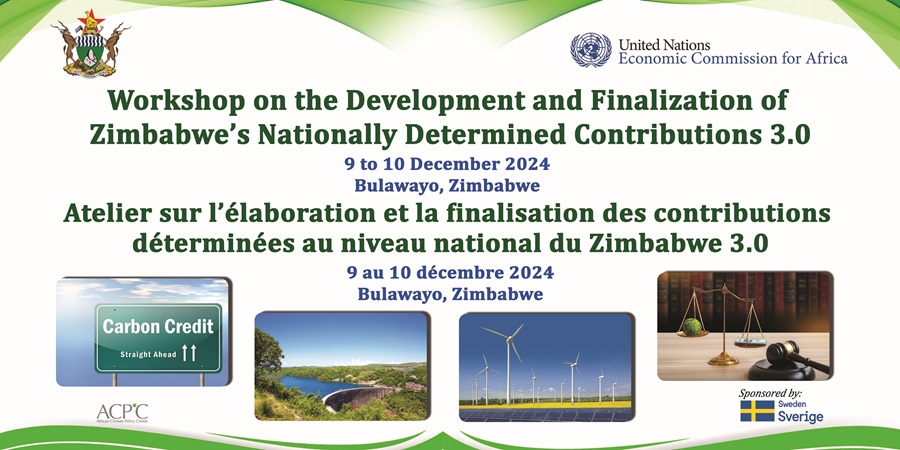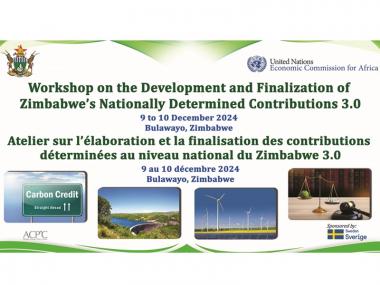
Summary
The African Climate Policy Center (ACPC) of UNECA is working with the Climate Change Management Department of the Ministry of Environment, Climate and Wildlife of Zimbabwe to support the development and finalization of NDC 3.0. A workshop is being organized to consult a range of Zimbabwean stakeholders on the strength and limitations of the current Nationally Determined Contributions and support Zimbabwe in developing NDC 3.0 which is progressive, ambitious and informed by the outcomes of first global stocktake.
Background
In the run-up to COP21, parties to the UNFCCC conceived Intended Nationally Determined Contributions (INDCs) as a means for countries to communicate the steps they will take to address climate change. INDCs reflected the level of ambition by each country in reducing emissions, considering its national circumstances and capabilities.
The Paris Agreement implementation framework calls for countries to submit new, revised and enhanced NDCs starting in 2020, and every five years thereafter. In addition, the Agreement requires parties to participate in a global stocktaking of progress in the reduction of global CO2 emissions every five years, which has started in 2023.
Since 2019, ACPC in collaboration with regional institutions, the NDC hub and the NDC partnerships, has embarked on a structured process for assisting member states in revising their NDCs. The ongoing support has been demand led and includes revision and updating of the existing NDCs. Although the specific areas of support vary from country to country, the cross-cutting thread has been consultations among stakeholder groups such as climate sensitive sectors (agriculture, energy, water, transport), policy makers, academics, youth and women, and alignment of NDCs with national development plans.
The African Climate Policy Center
The African Climate Policy Centre influences, strengthens and enables the transition to climate-resilient development in Africa through responsive policies, plans and programs towards transformed economies, healthy ecosystems and human well-being. The Centre serves as a knowledge hub and policy facilitation arm for poverty reduction through mitigation and adaptation to climate change in Africa.
The African Climate Policy Center vision is “to make Africa’s development sustainable, inclusive and climate-resilient”. Its mission is “to influence, strengthen and enable the transition to climate-resilient development in Africa through responsive policies, plans and programs towards transformed economies, healthy ecosystems and human wellbeing”.
Overall objective
The primary objective of the workshop is to engage stakeholders from climate-sensitive sectors - including agriculture, energy, water, transport- to identify key issues within the current Nationally Determined Contributions (NDC) based on the outcomes of the first stock take and to support the development of NDC 3.0 in alignment with national development plans.
Specific objectives
- To discuss the objectives and activities of the recently developed National Adaptation Plan and incorporate its targets into NDC 3.0, which is currently in preparation.
- To discuss ways of incorporating unconditional emission reduction targets into NDC 3.0 based on review of current policies, programs and initiatives that contribute to emission reduction.
- Examine the risks of climate change and the vulnerability of both humans and ecosystems in Zimbabwe, and establish measurable targets for loss and damage to reduce vulnerability and enhance resilience
- Consult with stakeholders, including government agencies, private sector entities, and civil society, to determine which sector can participate in market mechanism focusing on those with highest potential for emission reduction.
Expected Outputs:
- Objectives and activities of the recently developed National Adaptation Plan discussed, with its targets incorporated into NDC 3.0.
- Strategies for incorporating unconditional emission reduction targets into NDC 3.0 identified through a review of current policies, programs, and initiatives.
- Risks of climate change and the vulnerability of humans and ecosystems in Zimbabwe examined, leading to the establishment of measurable targets for loss and damage.
- Sectors with the highest potential for participation in market mechanisms for emission reduction identified.
Key Participants:
Representatives from the Ministry of Environment, Climate and Wildlife; Ministry of Lands, Agriculture, Water, Climate and Rural Resettlement; Ministry of Finance and Investment Promotion; Ministry of Industry and Commerce; Ministry of Transport and Infrastructural Development; Women Affairs Small and Medium Enterprise, the Private Sector and other Development Partners will attend the workshop
Document
Presentations
- Existing national projects and initiations which can reduce emissions including renewable energy project, energy efficiency initiatives, waste management improvements and transportation initiatives
- Findings of the 1st GLOBAL STOCKTAKE and how to incorporate them into Zimbabwe’s NDC
3.02.0 - NDC tracking under BTR1: Status of the implementation of the Current NDC
- Overview of Zimbabwe's national climate change adaptation plan
- Climate and Climate related Policies and Program in different Sectors in Zimbabwe which can lead to Emission Reduction
- Climate Variability, Climate Change and Its Risks in Zimbabwe - Charity Denhere
- International Market Mechanisms in Nationally Determined Contributions - Tirivanhu Muhwati
- Vulnerability, Impacts and Adaptation
- The NDC 3.0 road map - Dhoba Lovemore
